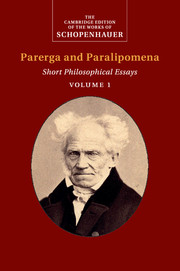Book contents
- Frontmatter
- Contents
- General Editor’s Preface
- Editorial Notes and References
- Introduction
- Notes on Text and Translation
- Chronology
- Bibliography
- Parerga and Paralipomena: Contents
- Preface
- Sketch of a History of the Doctrine of the Ideal and the Real
- Fragments for the History of Philosophy
- On University Philosophy
- Transcendent Speculation on the Apparent Deliberateness in the Fate of the Individual
- Essay on Spirit-Seeing and Related Issues
- Aphorisms on the Wisdom of Life
- Chapter I Fundamental Division
- Chapter II What One Is
- Chapter III What One Has
- Chapter IV What One Represents
- Chapter V Counsels and Maxims
- Chapter VI On the Different Stages of Life
- Versions of Schopenhauer’s Text
- Glossary of Names
- Index
Chapter II - What One Is
Published online by Cambridge University Press: 30 June 2022
- Frontmatter
- Contents
- General Editor’s Preface
- Editorial Notes and References
- Introduction
- Notes on Text and Translation
- Chronology
- Bibliography
- Parerga and Paralipomena: Contents
- Preface
- Sketch of a History of the Doctrine of the Ideal and the Real
- Fragments for the History of Philosophy
- On University Philosophy
- Transcendent Speculation on the Apparent Deliberateness in the Fate of the Individual
- Essay on Spirit-Seeing and Related Issues
- Aphorisms on the Wisdom of Life
- Chapter I Fundamental Division
- Chapter II What One Is
- Chapter III What One Has
- Chapter IV What One Represents
- Chapter V Counsels and Maxims
- Chapter VI On the Different Stages of Life
- Versions of Schopenhauer’s Text
- Glossary of Names
- Index
Summary
That this contributes much more to a person's happinessthan what he has, orwhat he represents, wehave already recognized in general. All depends onwhat someone is and, accordingly, has in himself;for his individuality accompanies him at all timesand in all places; it colours all that heexperiences. In and through everything he initiallyenjoys only himself; this is true of the bodily, butmuch more of the intellectual pleasures. Hence theEnglish ‘to enjoy one's self’ is a very fittingexpression, with which, for example, we say ‘heenjoys himself at Paris’, thus not ‘he enjoysParis’, but ‘he enjoys himself in Paris’. – However, if theindividual character is badly constituted, allpleasures are like delicious wines in a mouth fullof bile. Accordingly, in good times and bad times,leaving aside great calamities, it is less importantwhat befalls us in life than how we feel about it,hence what is the nature and the degree of ourreceptivity in every respect. What someone is andhas within himself, in short, personality and itsworth, is the only thing that immediately counts forhis happiness and well-being. Everything else ismediate; consequently, its effects can befrustrated, but those of personality never. For thatreason, envy directed towards personal merits is themost unforgiving, as it is also the most carefullyconcealed. Moreover, the constitution ofconsciousness alone is persistent and enduring, andindividuality acts constantly and incessantly, moreor less at every moment; everything else only actsfrom time to time, occasionally, temporarily, and isalso subject to reversal and transformation. HenceAristotle says: ‘Nature is permanent, but wealth isnot.’ 344 Because of this we bear a misfortune thathas befallen us entirely from the outside with morecomposure than one that is self-inflicted; for fatecan change, but one's own nature never.
- Type
- Chapter
- Information
- Schopenhauer: Parerga and ParalipomenaShort Philosophical Essays, pp. 282 - 302Publisher: Cambridge University PressPrint publication year: 2014

